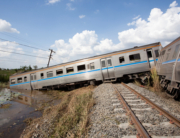There are three things you should do after a train accident. These steps can safeguard your health and well-being and protect your right to compensation for your injuries.
Get Medical Care
The first step you should take is to get medical help right away. You stand the best chance of healing well if your known injuries receive prompt medical attention.
Many people sustain hidden injuries from traumatic accidents. The symptoms might not show up for days, and by then, it could be too late. Brain injury, internal bleeding, and neck and spinal cord injuries can have delayed symptoms, even though you could be experiencing permanent damage. A professional trauma evaluation can discover injuries like these while there is still time to have a good outcome.
Also, your medical records will link your injuries to the train accident, showing that the incident caused the harm you suffered. If you do not get professional medical care right away, the insurance company may claim that you got hurt from something other than the train accident.
Talk to a Lawyer
If you delay talking to a personal injury lawyer, some of the evidence could disappear and it could become difficult to locate eyewitnesses. You should meet with an attorney right after you take care of your injuries.
You have a limited amount of time to file a lawsuit for your injuries. If you miss the deadline, you could be stuck with a stack of medical bills and few options for recovery.
Your lawyer will help you determine who is responsible for your injuries. The person or company whose negligence caused you to suffer harm will be liable. You might think that the train company is the only party you can sue, but others could be responsible as well, depending on the facts of your case.
The at-fault party could vary, based on whether you got hurt:
- During a collision between the train and a vehicle while you were in the outside vehicle
- Outside of the train, while on foot
- Inside the train when the train crashed
- From a slip and fall accident inside the train
- Inside the train, from the negligent or intentional act of another passenger
- When a sudden movement or braking of the train caused something or someone to fall on you or slam into you, or sent you airborne
Safeguard the Evidence
Write down as many details as you can about the train accident and everything that happened beforehand that might be relevant. Memories fade over time, and thorough notes can help you to remember.
Also, do not throw away or dispose of anything from that day that could help to illustrate your case. For example, the clothes you were wearing at the time of the accident can be valuable evidence. Do not delete photos or videos from your cell phone until your lawyer sees them.
Getting Help With Your Train Accident Injury Claim
There is no need for you to try to figure out the liability issues associated with a train accident on your own. At the Montero Law Center, we help injured people recover the compensation they deserve. Call us today at 954-767-6500 to set up your free consultation.
 English
English  Español
Español 



